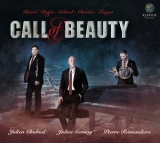Mit dem im Grund lyrischen, aber immer wieder auch dramatisch sich aufbäumenden Trio Lirico von Nicolas Bacri beginnt diese CD mit Stücken für Klarinette, Horn und Klavier. Das gutgelaunte, vierteilige Stück Les Points Cardinaux des 1966 geborenen Jean-Jacques Charles führt zu dem längsten Werk der CD, Les Ombres Errantes von Karol Beffa, einem Trio, das auch in anderen Besetzungen verfügbar ist.
Vier Kompositionen von Beffa beinhalten das Wort Ombres, Schatten. Andere Titel gehen in die gleiche Richtung: Tenebrae, Dark, Paradise Lost,… Der französische Komponist hat eine Vorliebe für die Dämmerung, für Halbtöne, nicht zuletzt weil er, wie er sagt, von Natur aus ängstlich ist und vom Gedanken an den Tod verfolgt wird.
In Les Ombres Errantes wird ein rhythmischer Mittelsatz von zwei langsamen gerahmt. Der erste ist lyrisch und relativ hell in den Farben, wobei sich die Klarinette von Julien Chabod schattenhaft um den Klavierklang wickelt, um im Mittelteil auch nervös und schrill aufzuschreien. Es ist eine regelrecht Szene, die sich der Hörer vorstellen kann, entweder mit Menschen oder, warum nicht, mit Tieren, und dann denkt man unweigerlich an eine Fortsetzung von L’après-midi d’un faune. Im Mittelsatz fordert die bizarre Rhythmik des Klaviers die Klarinette zu einem sprunghaften Musizieren heraus. Auch in diesem Satz sind der menschlichen Fantasie keine Grenzen gesetzt, um sich auszumalen, was da gerade vor unseren sehenden Ohren passiert, ehe im Schlusssatz das Werk in schattenhaften Klängen endet.
Es folgt das kurze Menaces de l’Arc von John Farjot, ehe das sehr charakteristische A Thing of Beauty von Olivier Carmel die CD abschließt. Es beginnt mit einem Hornruf, dann folgt ein meditatives Klarinettenthema, dem sich das Horn anschließt, lyrisch und ernsthaft. Das ist der Auslöser für ein postminimalistisches Vivace, dessen drängende Rhythmik an eine lustige Fahrt in einem Cabrio durch eine Frühlingslandschaft erinnert.
Die hervorragenden, ausdrucksvollen Interpretationen und die Tonaufnahme lassen nichts zu wünschen übrig. Die drei Musiker bilden ein vorbildliches Trio. Der außergewöhnlich schöne Klarinetten-Ton von Julien Chabod, das warme, stets klangschöne Horn von Pierre Remondière verschmelzen mit dem immer präsenten Klavier zu einem sehr hohen Maß an Ausgewogenheit und Homogenität. Ausstrahlung und Spannung bleiben vom ersten bis zum letzten Ton erhalten. Die Akzente sind sorgfältig gesetzt und abgestuft, die Tempi sind beherrscht, die Klanggewichte mit Umsicht ausbalanciert. Und immer wieder überrascht dabei die interpretatorische Einigkeit, die das A und das O dieser Einspielungen ist.
This CD with pieces for clarinet, horn and piano begins with Nicolas Bacri’s Trio Lirico, which is fundamentally lyrical but repeatedly rears up dramatically. The good-humored, four-part piece Les Points Cardinaux by Jean-Jacques Charles, born in 1966, leads to the longest work on the CD, Les Ombres Errantes by Karol Beffa, a trio that is also available in other instrumentations.
Four of Beffa’s compositions contain the word ombres, shadows. Other titles go in the same direction: Tenebrae, Dark, Paradise Lost…. The French composer has a preference for twilight, for halftones, not least because, as he says, he is naturally fearful and haunted by the thought of death.
In Les Ombres Errantes, a rhythmic middle movement is framed by two slow ones. The first is lyrical and relatively bright in color, with Julien Chabod’s clarinet wrapping itself shadowily around the piano sound, only to cry out nervously and shrilly in the middle section as well. It is a downright scene for the listener to imagine, either with humans or, why not, animals, and then one inevitably thinks of a sequel to L’après-midi d’un faune. In the middle movement, the bizarre rhythms of the piano challenge the clarinet to make erratic music. In this movement, too, there are no limits to the human imagination to imagine what is happening in front of our seeing ears. The work ends in shadowy sounds.
John Farjot’s short Menaces de l’Arc leads to Olivier Carmel’s very characteristic A Thing of Beauty, the final piece of this the CD. It begins with a horn call, then a meditative clarinet theme is taken over by the horn too, lyrical and serious. That sets the stage for a postminimalist Vivace, whose urgent rhythm recalls a fun ride in a convertible through a springtime landscape.
The superb, expressive interpretations and sound recording leave nothing to be desired. The three musicians form an exemplary trio. The exceptionally beautiful clarinet tone of Julien Chabod, the warm, ever-sounding horn of Pierre Remondière blend with the ever-present piano to a very high degree of balance and homogeneity. Radiance and tension are maintained from the first note to the last. The accents are carefully set and graduated, the tempi are mastered, the tonal weights carefully balanced. And again and again the interpretative unity surprises, which is the be-all and end-all of these recordings.






















